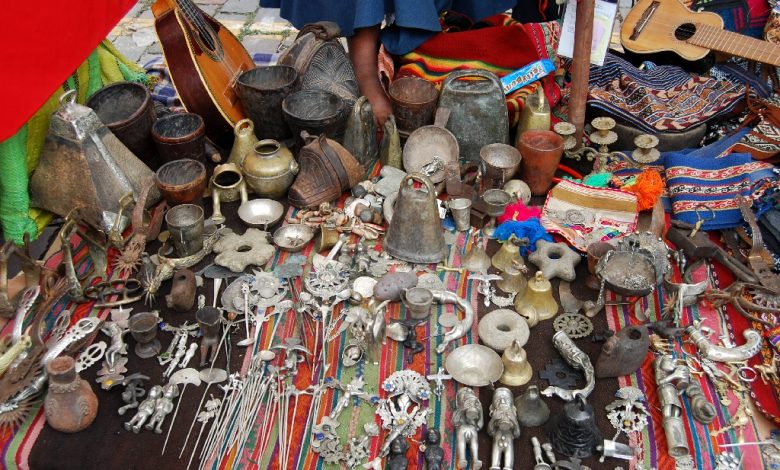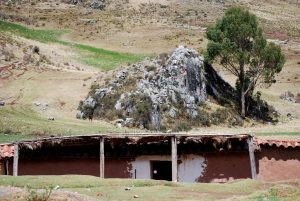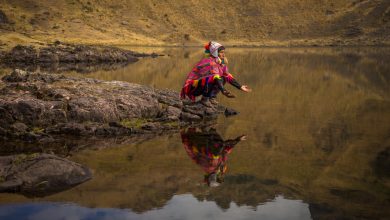Huaqueros–Grave Robbers–Seek Treasure during Holy Week

Holy Week is many things, the axis of the Catholic calendar and the time when huaqueros (wah-kay-rows), grave robbers, hit ancient sites looking for treasure. They say Holy Week is a good time for them to work without fear because God is busy and does not see what they are doing right now.
They also say that during this week the earth opens. It becomes more sensitive. In the mountains antimony breaks out as a gas from ancient stores of silver. It is very dangerous. They gas stings and burns, they say. It can cut through you like a dagger.
Huaqueros look for flares of antinomy or flares of light, they say, to know where there are hidden stores of treasure, what in Spanish they call “tapados” or covered, hidden things. They say that you can see where there is gold or silver, though they also use metal detectors.
At night, they say, you can see the glow, the burning of antimony. Of course many people do not believe this. They prefer the technology of a metal detector, but the huaqueros still tell stories of the gases and their danger.
Tawantinsuyo, the Inca Empire, was immense and throughout it there are many sites that remain un-excavated by archeologists, though they are constantly sought by huaqueros. They talk to one another and spread information around though a person who has found a good tapado might keep its location a secret while working it.

They see their task as dangerous. They face physical danger from the earth, and spiritual danger from God and his allies, as well as from the metaphysical guardians of the sites. As a result a moment like Holy Week, when God is occupied with the passion of Jesus, is a good time to go out they think. Still they must make offerings to the earth and to the site to protect themselves. The offerings are justifiably called payments.
There are large sites and very small ones, sometimes they make large finds and sometimes only small ones of small pins or objects in gold and silver. Holy Week is especially good because there is also a full moon. The night is illuminated.
Of course the huaqueros are not only looking for treasures from Inca times but also from the days of the Spaniards. They will find tupos (pins) as well as golden llamas or human figures. They also find chains, teeth, bracelets, barrettes, and more. To get them the huaqueros will often tear apart an entire tomb.
The National Institute of Culture (INC) and the police are in constant battle with them because this activity is illegal. Nonetheless, the huaqueros say that the INC itself is an agency of huaqueros. That is how they understand what archeologists do and the huaqueros relate that they are far beyond the INC, that it cannot hold a candle to them. It is too slow.
When a huaquero has a site in mind, Holy Week and the month of August are good times to tackle the work of opening it and seeking treasure. They say the good tapados are found some two meters down in the earth, although ordinary ones can be only a meter deep.
Huaqueros say that every site has its guardian who watches over the treasures. They are like spirits or souls. They often call them machus, or old ones, ancestors. Many people tell of seeing them. One of the most well known guardians is called Juanquillo. They say that the guardians always ask for something in exchange for letting the huaqueros have the treasure. The demands are often very costly. One man told that one guardian asked for the fetus of a woman in exchange for the treasure. People also speak of huaqueros who have to give up their own soul for the treasure.

Though people claim that many of the successful businesses in Cuzco started as means of investing the fortunes of huaqueros, they also say that the money brought out is cursed. On friend said his hand twisted and shrank as a result of working as a huaquero. They also say that the money you gain flows like water through your hands.
In the Andes it is a custom that if the earth gives you something you owe something back.
Many people around Cuzco talk about huaqueros. The police will raid the markets to try to catch illegally obtained antiquities and Peru raised an international protest recently over the auction of ancient artifacts by Sotheby’s in Paris. It claims the auction as well as the export of artifacts from the country was illegal.
Archeologists protest huaqueros because of the damage they do to sites and the way they destroy context, hence knowledge. To an archeologist it is not the artifact but it in context that matters since together they provide knowledge.
Nevertheless, the struggle goes on. These days, as the city of Cuzco celebrates Christ’s passion people will go out into the hills, especially into Vilcabamba they say, to seek for treasure.




